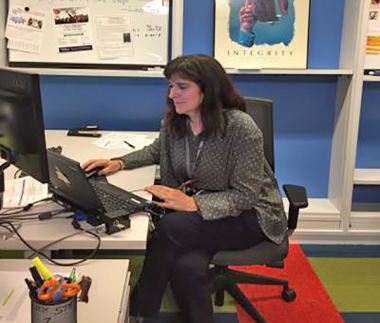
By Carmen N. Veloria, Senior Manager for Community Relations and Outreach, at the College Planning Center operated by American Student Assistance (ASA) in the Boston Public Library. The Planning Center is MassEdCO's Educational Opportunity Center partner in Boston.
On any given day, ASA's College Planning Center sees an average of 15-20 clients. They come from all walks of life and for a host of reasons. Whether they are seeking assistance with financial aid, help with the college admissions process, or career counseling – educational advisors play a pivotal role in assisting them with their needs. They set the tone and are instrumental in helping clients feel at ease, engage in conversation, and ultimately feel empowered to embark on a new journey.
After 13 years at the Center, Debbie Mills is an education advisor who has seen it all. In May, she will be retiring from the Center. Recently, I took the opportunity to asked her to reflect on her tenure at the Center.
CNV: Tell me about your role as an advisor.
DM: Every person has a story. I am always amazed at people’s stories and privileged that in some small way I get to be part of the positive change they seek. I have met with so many people who have newly arrived to this country eager for higher education, or are first in their families to go to college, or who have simply needed to change course, start over. I never tire of asking questions with the goal that they feel safe to share their histories so I can better assist them. Every story is unique, so knowing what to ask, when to ask is important. The ability to listen is key – it’s been the one constant despite the diversity of stories.
CNV: Is there a particular story that stands out?
DM: Oh, a mother and daughter team. They came in to complete the FAFSA/CSS Profile. There’s a section on the form that asks, “Is your parent attending school?” The mother answered no, and proceeded to comment that even if she wanted to, it was her daughter’s time. She said, "I have taken pre-requisites for nursing but I will have to wait.” I looked at her and asked, “Are you ready?" That day, I ended up persuading her to continue her education and we completed her FAFSA as well. They ended up matriculating in different colleges and in 2016, each graduated with her bachelor’s degree. I’ll never forget this story. It was a simple question that turned into a parallel road.
CNV: What advice might you offer someone new to this work?
DM: Listen, really listen. If someone comes in to complete a FAFSA, ask pertinent questions. It’s not just about completing the form. Take the time to talk about educational goals and career plans. Be willing to help them explore. Create a space where they are at ease to ask questions, get informed, and walk out empowered to take that next step.
CNV: This is great, thank you.
It has been established that mentoring and relationship building is enormously important when working with low-income and first-generation college students. This is no less important in a walk-in, community-based center. Increasingly, clients come in seeking to reconnect with their initial advisor. They take pride in calling and e-mailing them to keep them informed and will often refer other clients, particularly family members. By taking a holistic approach to advising, the advisors focus on factors that go beyond a “check-list approach" to college and career advising. They pay attention to body-language, what is said and not said. Most importantly, however, they take the time to listen, and like Debbie – they ask key questions!
